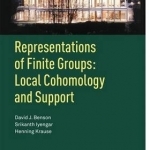Representations of Finite Groups: Local Cohomology and Support
BookThis item doesn’t have any media yet
2011 | Science & Mathematics
The seminar focuses on a recent solution, by the authors, of a long standing problem concerning the stable module category (of not necessarily finite dimensional representations) of a finite group. The proof draws on ideas from commutative algebra, cohomology of groups, and stable homotopy theory. The unifying theme is a notion of support which provides a geometric approach for studying various algebraic structures. The prototype for this has been Daniel Quillen's description of the algebraic variety corresponding to the cohomology ring of a finite group, based on which Jon Carlson introduced support varieties for modular representations. This has made it possible to apply methods of algebraic geometry to obtain representation theoretic information. Their work has inspired the development of analogous theories in various contexts, notably modules over commutative complete intersection rings and over cocommutative Hopf algebras. One of the threads in this development has been the classification of thick or localizing subcategories of various triangulated categories of representations.
This story started with Mike Hopkins' classification of thick subcategories of the perfect complexes over a commutative Noetherian ring, followed by a classification of localizing subcategories of its full derived category, due to Amnon Neeman. The authors have been developing an approach to address such classification problems, based on a construction of local cohomology functors and support for triangulated categories with ring of operators. The book serves as an introduction to this circle of ideas.
Related Items:
| Published by | Springer Basel |
| Edition | Unknown |
| ISBN | 9783034802598 |
| Language | N/A |
Images And Data Courtesy Of: Springer Basel.
This content (including text, images, videos and other media) is published and used in accordance
with Fair Use.
